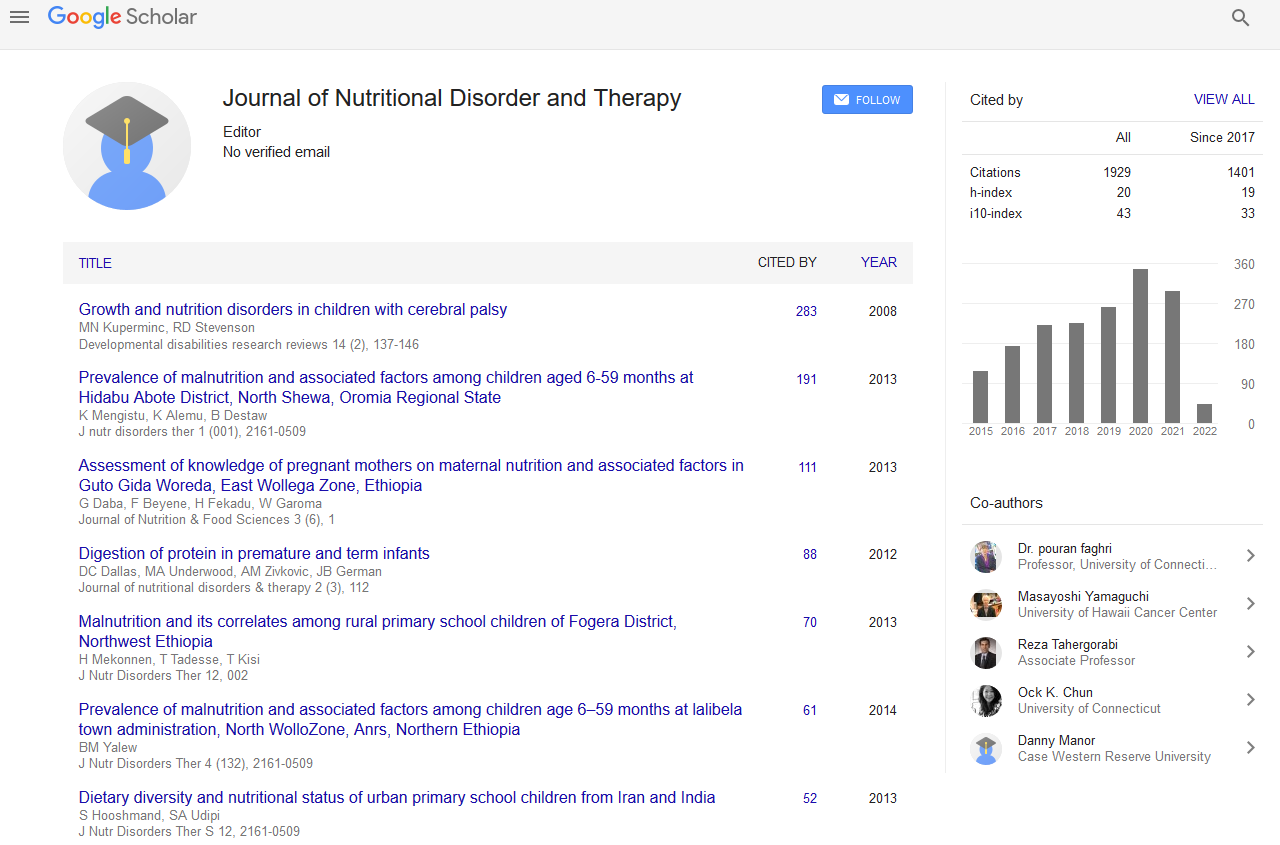Indexed In
- Open J Gate
- Genamics JournalSeek
- Academic Keys
- JournalTOCs
- Ulrich's Periodicals Directory
- RefSeek
- Hamdard University
- EBSCO A-Z
- OCLC- WorldCat
- Publons
- Geneva Foundation for Medical Education and Research
- Euro Pub
Useful Links
Share This Page
Journal Flyer

Open Access Journals
- Agri and Aquaculture
- Biochemistry
- Bioinformatics & Systems Biology
- Business & Management
- Chemistry
- Clinical Sciences
- Engineering
- Food & Nutrition
- General Science
- Genetics & Molecular Biology
- Immunology & Microbiology
- Medical Sciences
- Neuroscience & Psychology
- Nursing & Health Care
- Pharmaceutical Sciences
Evaluation of serum ferritin level, insulin resistance and nutritional status in adults
15th International Conference on Clinical Nutrition
May 24-26, 2018 | Vienna, Austria
Perim F Turker
Baskent University, Turkey
Scientific Tracks Abstracts: J Nutr Disorders Ther
Abstract:
The aim of this study was to evaluate serum ferritin level, insulin resistance and nutritional status in adults. The study was conducted on 109 individuals (84.4% women and 15.6% men), between the ages of 18â�?�?64 years. A questionnaire was administered including the questions related with sociodemographic attributes, nutritional habits by face to face interview method. Some anthropometric measurements and biochemical parameters were analyzed. All data was evaluated by SPSS 21.0 for Windows. Individuals were divided into four quartiels according to serum ferritin levels; (â�?¤18.1 ng/mL Q1,18.2â�?�?31.1 ng/mL Q2,31.2â�?�?73.35 ng/mLQ3, â�?¥73.36 ng/mL Q4). Individuals whose insulin resistance (HOMA-IR) level was above 2.7, were ins�?¼lin resistant group. The mean age of women and men was 37.0�?±10.65 years and 32.4�?±10.44 years, respectively. It was determined that 69.2% of obese women (BMI â�?¥30.0 kg/m2) were in Q1, 33.4% of them were in Q3 and 86.7% of them were in Q4 (p<0.05). When waist circumference, waist/hip ratio, percentage of body fat classifications of individuals were examined, there was no statistically significant difference between quartiles in both women and men. HOMA-IR values were higher in Q4(4.1�?±2.66) than the other quartiles (p<0.05). Serum fasting insulin levels were significantly higher in Q4 than other quartile qroups; serum HDL cholesterole in Q4 was lower than other quartiles. Serum ferritin levels were significantly higher in individuals that have insulin resistance (71.1�?±70.28ng/mL) than in individuals that doesnâ�?�?t have insulin resistance (42.9�?±37.55ng/mL). As a conclusion, high serum ferritin levels may be a risk factor for insulin resistance. To protect these risk factors, a person-specific diet and lifestyle changes should be recommended.
Biography :
Perim F Türker has completed her PhD in 2008 from Hacettepe University, Institute of Health Science, Nutrition and Dietetics Program. She has been working at Baskent University since 1995. She has worked as a Dietitian at Baskent University Ankara Hospital for 15 years. Now, she is working as an Assistant Professor at Ba�?kent University Health Science Faculty, Department of Nutrition and Dietetics. She has published more than 15 papers and presented more than 50 researches in national and international scientific platforms.
Email:pfturker@baskent.edu.tr


